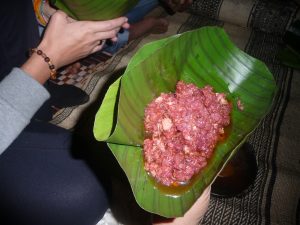 The Feast of the Holy Cross (called ‘Meskel’) is one of the biggest celebrations in Ethiopia. It is especially celebrated in the Gurage region where we had the opportunity to spend a few days and see the celebrations for ourselves. Our friend Desalegn invited us, so we could observe life in his village. We slept in a traditional hut that we shared with Desalegn’s relatives.
The Feast of the Holy Cross (called ‘Meskel’) is one of the biggest celebrations in Ethiopia. It is especially celebrated in the Gurage region where we had the opportunity to spend a few days and see the celebrations for ourselves. Our friend Desalegn invited us, so we could observe life in his village. We slept in a traditional hut that we shared with Desalegn’s relatives.
During the Meskel celebrations, whole families come to the villages to spend this special time together. Slaughtering a bull is one of the most important traditions and everyone is involved. After prayers were said, the men of Desalegn’s village slaughtered the animal by cutting its throat. Then everyone helped cut up the meat and prepared it to be eaten raw during the feast. Raw meat is a very popular delicacy in Ethiopians, especially when fresh.
That same day, the women prepared a traditional speciality called Kitfo – raw meat cut into very small pieces and served with butter and very hot spice. Nobody asked us if we would like some – we were all given a portion so we couldn’t refuse. Magda, my namesake, coped quite well, but it was a big challenge for me to eat raw meat. I ate just a little.
 According to tradition, Saint Helen, who wanted to find the Holy Cross to save it from desecration, discovered it by following the smoke of a fire. In memory of this event, people all over Ethiopia light bonfires on Meskel Eve. In the Gurage region, the people from the whole village meet together in a large open space and then light the bonfire together.
According to tradition, Saint Helen, who wanted to find the Holy Cross to save it from desecration, discovered it by following the smoke of a fire. In memory of this event, people all over Ethiopia light bonfires on Meskel Eve. In the Gurage region, the people from the whole village meet together in a large open space and then light the bonfire together.
After speeches by one or more leaders, people wish each a Happy New year. It is indeed the beginning of New Year according to the local calendar. Next they start to dance a traditional Gurage dance in a circle. After some time they go home and each family lights a bonfire in front of their house. Many people move from one bonfire to another.
We noticed that when a number of people gathered at one particular bonfire, many of the neighbours joined them. Then they all together wandered from place to place dancing and singing the same traditional song. This lasted late into the night.
The next day we went to a church for Mass. Afterwards, another large bonfire was lit. There was dancing and singing. First religious songs were sung and then the same traditional Gurage song as on Meskel Eve.
Many people visit their relatives and friends on Meskel Day. We too went with Desalegn to visit his relatives. Everywhere we were welcomed with food and drink, starting with coffee and various snacks and finishing with Kitfo.
 Summing up, I can say we personally witnessed the Gurage traditions associated with the Feast of the Holy Cross. It is special family time for this tribe. Just as in Poland we spend Christmas with our close relatives and friends, with special meals together, eating Christmas fare, the Gurage people spend most of the time sitting, talking and eating together. Of course there are also differences. For instance, the Gurage people do not use tables for meals and don’t spend hours watching TV.
Summing up, I can say we personally witnessed the Gurage traditions associated with the Feast of the Holy Cross. It is special family time for this tribe. Just as in Poland we spend Christmas with our close relatives and friends, with special meals together, eating Christmas fare, the Gurage people spend most of the time sitting, talking and eating together. Of course there are also differences. For instance, the Gurage people do not use tables for meals and don’t spend hours watching TV.
During our brief visit, we had a privileged view of a Gurage family. They allowed us to come into their life, feel the atmosphere of the place, observe the way they greet each other, have their meals, drink coffee and talk to each other. We saw up close how they work, rest, celebrate and live their daily life. It was a really interesting and enriching experience. We sincerely thank Desalegn and his relatives and the Gurage people for this great honour.
Magda Fiec, CLM Awassa (Ethiopia)



